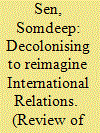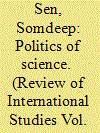|
|
|
Sort Order |
|
|
|
Items / Page
|
|
|
|
|
|
|
| Srl | Item |
| 1 |
ID:
145626


|
|
|
|
|
| Summary/Abstract |
Two decades later, how should we conceptualize the relevance of the Oslo Accords today? This article reconstitutes our understanding of the Accords through three parameters and purports that the legacy of the Interim Agreement is one that oscillates between what it has failed to achieve with regard to the Palestinian quest for statehood and what it continues to do as a mechanism influencing the “brand” Palestinian politics that can be practiced (uninhibitedly) within the occupied Palestinian territories (oPt). In this way, charting the path for future research, this article concludes that any subsequent studies on Palestinian politics and political behavior would need to account for both what the Accords has not done and what it continues to do.
|
|
|
|
|
|
|
|
|
|
|
|
|
|
|
|
| 2 |
ID:
192307


|
|
|
|
|
| Summary/Abstract |
Seeing as colonialism is ubiquitous to where International Relations (IR) comes from, what it explains and who it represents, many have argued that the decolonisation of the discipline is impossible. However, in this agenda-setting introduction, I place decolonisation squarely in the realm of possibility and ask, ‘what would a decolonised field look like?’. In answering this question, the contributions in this forum take point of departure from varied sites within the discipline, as they seek to materialise real change that reimagines what IR is and does as a discipline that was established as a scholarly defence for colonialism. Herein they propose decolonisation as a structure that upends the discipline’s colonial epistemological roots, rethinks core concepts and underlines the need to forefront geographies, peoples, and perspectives that were underrepresented in a colonial discipline. Equally, they recognise that decolonisation is a messy affair, that takes a non-linear trajectory. However, seeing as colonialism did not just inflict material impoverishment but also sought to alienate the colonised from their sense of self, this messiness is only expected. So, rather than be discouraged by this, this forum views the non-linear trajectory to be an unavoidable facet of any attempt at decolonising the discipline.
|
|
|
|
|
|
|
|
|
|
|
|
|
|
|
|
| 3 |
ID:
192313


|
|
|
|
|
| Summary/Abstract |
This postscript deliberates the wider implications of decolonising the academy. It takes point of departure in the often-contentious public discourse on the topic and asks, why is the decolonisation agenda so concerning to public officials and the target of public policy? In many ways, derisive and irreverent responses to efforts to decolonise universities, schools, and the curricula is only expected seeing as it has the potential to disrupt the futures of the beneficiaries of colonial norms, practices, and institutions. But equally, the decolonisation agenda is contentious as it unsettles the assumption that scientific knowledge production is an apolitical affair. There are of course ample examples of scientific ‘progress’ being deeply indebted to histories and legacies of colonialism. However, it is in revealing this politics of science that decolonisation finds wider political relevance as not just an effort to recognise and remedy the legacies of colonisation in the academy. It also reveals the politics that is embedded in what we know and, in doing so, underlines the fallibility of a singular (scientific) frame, means of measurement, or rule of inference for understanding a social reality. In fact, decolonisation understood in this way is about opening up the possibility of acknowledging there isn’t a social reality. Every social phenomenon can be experienced in a multiplicity of ways and therefore reimagining IR in view of decolonising it requires a political response that empirically, methodologically, and theoretically forefronts the multiplicity of perspectives and experiences that have thus far been marginalised in the studying and understanding of social realities.
|
|
|
|
|
|
|
|
|
|
|
|
|
|
|
|
|
|
|
|
|